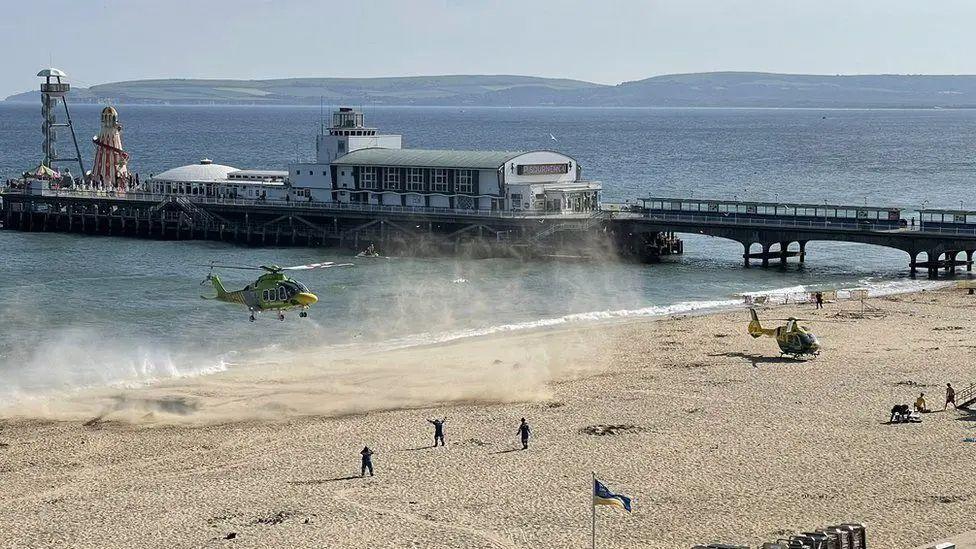Lifeguard tells inquest of beach rescue attempts

Twelve-year-old Sunnah Khan and 17-year-old Joe Abbess both drowned off Bournemouth beach
- Published
A lifeguard has told an inquest he responded "as quickly as I could" to rescue swimmers when an apparent rip current hit Bournemouth beach.
Joe Abbess, 17, from Southampton, and 12-year-old Sunnah Khan, from High Wycombe, Buckinghamshire, died after getting into trouble in the water off Bournemouth Beach on the afternoon of 31 May 2023.
Giving evidence, RNLI senior lifeguard Thomas Sadd recalled seeing "something unusual happening in the water" before swimming to the aid of casualties.
He described rescuing two of Sunnah's family members and learnt she was still in the water when back on the beach.
A previous hearing was told a rip current led to the deaths of the two youngsters, with eight other people needing treatment from paramedics.
Mr Sadd, who had experience of being a lifeguard on Bournemouth beach since 2018 told the inquest there was "no indication" earlier in the day of hazardous conditions that could have caused a rip current.
He said there had been an easterly wind and signs had been placed on the beach telling bathers to stay between the red and yellow flags.

Air ambulances landed on Bournemouth beach following the incident
Asked whether he thought there was sufficient lifeguards on the beach that day, he relied: "Yes I did - there was no prior warning. We were prepared for an increase in the beach population. I didn't feel we needed more resources that day."
Mr Sadd told the inquest he had seen rip currents on a number of occasions
He said he had gone to the waterside to change roles with a colleague when he saw people in difficulty.
He described getting "rescue ready" while "simultaneously" people on the beach were telling him "I think those people need help".
The court heard CCTV footage showed Mr Sadd entering the water at 15:53 BST.
He said he saw two people - family members of Sunnah - who he said "were furthest out to sea and looked most in difficulty".
While paddling towards them on a board through "choppy" conditions, he described seeing another group in difficulty and said he made a "lasso" hand signal to alert other lifeguards.
When asked about the speed of his response, Mr Sadd told the inquest: "I responded as quickly as I could, having to navigate through the water population to get to them."
He said he was only been made aware when back on the beach treating the casualties that Sunnah was still missing.
Mr Sadd told the inquest he did not have a waterproof pack with a radio that could have been taken into the water.
"The intended message to the tower and [another lifeguard] - he understood the message and proceeded to the group that needed rescued. I'd say it didn't impact the rescue," he added,
Legal representatives of both families thanked Mr Sadd and other lifeguards for their "bravery" during the rescue attempts.
Giving evidence, the RNLI's lifeguard operations manager Peter Dawes told the inquest the lifeguards on duty "did an extremely good job".
He said: "From a systems point of view, they had the right resourcing levels and followed their operating procedures."
The organisation had experienced issues over the "procurement and reliability" of the waterproof radio packs, with the radio prone to being affected by sand and sea water, he added.
The inquest continues.
Get in touch
Do you have a story BBC Dorset should cover?
You can follow BBC Dorset on Facebook, external, X (Twitter), external, or Instagram, external.
- Published2 October 2024

- Published1 October 2024

- Published24 September 2024
